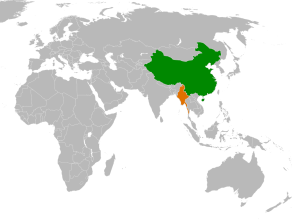Myanmar: Now a Site of Sino-US Geopolitical Competition?
 On November 14th, 2014, Chinese Premier Li Keqiang visited Myanmar and held talks with President U Thein Sein. These talks were punctuated by the signing of a multitude of deals that covered trade, agriculture, energy cooperation, and other fields. Myanmar also expressed willingness to be a part of China’s goal to unite South Asia with its Bangladesh-China-India-Myanmar Economic Corridor. The fact that these deals came straight off the heels of President Obama’s visit to Myanmar implies that China and the United States continue to jockey for influence in Southeast Asia.
In the recently signed documents, the two countries reaffirmed their willingness to “deepen cooperation in a wide range of areas” including agriculture, trade and finance, and cultural exchanges. As Myanmar begins to open its economy, it recently rose to the chair of ASEAN (Association of Southeast Asian Nations) this year, many Chinese businesses have taken a greater interest in making investments. Just this year, China-Myanmar bilateral trade has seen almost a 200% increase to 17 billion USD. In addition, Chinese investment in Myanmar grew to $10.15 billion USD, which is a tenfold increase over the past ten years. The increased trade and foreign investment highlights China’s desire to develop an influential presence in Myanmar’s recently opened up market. As such, the recent agreements between China and Myanmar clearly hopes to build on that goal.
On November 14th, 2014, Chinese Premier Li Keqiang visited Myanmar and held talks with President U Thein Sein. These talks were punctuated by the signing of a multitude of deals that covered trade, agriculture, energy cooperation, and other fields. Myanmar also expressed willingness to be a part of China’s goal to unite South Asia with its Bangladesh-China-India-Myanmar Economic Corridor. The fact that these deals came straight off the heels of President Obama’s visit to Myanmar implies that China and the United States continue to jockey for influence in Southeast Asia.
In the recently signed documents, the two countries reaffirmed their willingness to “deepen cooperation in a wide range of areas” including agriculture, trade and finance, and cultural exchanges. As Myanmar begins to open its economy, it recently rose to the chair of ASEAN (Association of Southeast Asian Nations) this year, many Chinese businesses have taken a greater interest in making investments. Just this year, China-Myanmar bilateral trade has seen almost a 200% increase to 17 billion USD. In addition, Chinese investment in Myanmar grew to $10.15 billion USD, which is a tenfold increase over the past ten years. The increased trade and foreign investment highlights China’s desire to develop an influential presence in Myanmar’s recently opened up market. As such, the recent agreements between China and Myanmar clearly hopes to build on that goal.
The bilateral talks also included language that signaled Myanmar’s willingness to be a part of China’s plans for an economic corridor in Southeast Asia. The Bangladesh-China-India-Myanmar Economic Corridor (BCIM) plans to provide broad economic connectivity among the four nations in the areas of investment, people-to-people exchanges, and trade. BCIM has already been endorsed by China India, and even Bangladesh. With Myanmar’s interest, the trade deal seems ever closer to completion. If signed, this agreement could provide enormous economic benefits to all countries involved as well as to the rest of Southeast Asia.
China’s push to include Myanmar in the BCIM deal represents its desire to build a strong network of trade agreements among its neighbors. Last year, China sought to create better relations through the implementation of the Silk Road Economic Belt. The “new” Silk Road would include billions of dollars in infrastructure and development in Central Asian countries. Myanmar’s willingness to be a part of BCIM represents a solid step in helping achieving China’s desire for strong and integrated trade networks among Asian nations.
China’s move to incorporate Myanmar can also be interpreted as a counter against United States’ influence in Southeast Asia. Earlier this year, China quickly moved to repair ties with Vietnam when the US ended its longstanding arms embargo on Vietnam. As President Obama recently visited Myanmar, China’s latest trade agreement with Myanmar appears to have continued that trend. The continued chess game between the China and the United States highlights the precarious position that many Southeast Asian countries have been put in.
Myanmar continues to be sandwiched between the two great powers in Asia, the United States and China. The U.S. continues to have many interests in Myanmar as it sees Myanmar to have the potential to deter China and serve as a new market for the American investments. Recently, the U.S. removed its tough sanctions on Myanmar as a reward for its democratic reforms. However, during President Obama’s recent visit to Myanmar, he prodded President Sein to accelerate the pace of change. His visit implied that Myanmar would not be able to have full ties with the United States unless the regime made the transition to a full Western liberal democracy. That sort of criticism did not appear in dialogue between China and Myanmar talks. The recent trade deal reflects China’s renewed pragmatism in Southeast Asia as it tries to create better relations in the region. Unlike the United States, China does not dictate requirements for democratic reforms in return for economic relations. China has supplied generous to aid to autocratic regimes in Africa as well as North Korea. As such, with strict conditions placed on Myanmar’s head by the United States, it could be possible that Myanmar will place itself in the Chinese sphere of influence.
Additional reporting by Leo Luo
